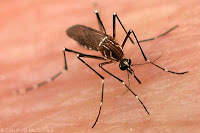We are trying to summarize some basic dos and donts for the benefit of all associate along with a small write ups on FAQs on Dengue .
DOs
keep the wet areas / drains / air - coolers etc. neat and dry
Use mosquito repellent / cream
Contact your doctor for preventive / post effect medicines
Wear full sleeve shirts and particularly children should be made to wear full-sleeve shirt and trousers
Eat / drink only home / safe cooked food
Don'ts
Do not allow water to accumulate anywhere
Do not consume medicine of your own
Do not eat at road side Dhabas or in open food stalls
Some FAQs What is Dengue Fever?
Dengue fever was previously 'break-bone fever' because it sometimes causes severe joint and muscle pain.
Dengue Fever is an illness caused by infection with one of four serotypes of a virus belonging to the genus Flavivirus. Infection with one of these serotypes does not provide cross- protective immunity, so a person living in an area where Dengue Fever transmission occurs can have four dengue fever infections during his or her lifetime.
Dengue [DEN-ghee] is a flu-like viral disease spread by the bite of infected mosquitoes. Dengue hemorrhagic fever is a severe, often fatal, complication of dengue.
Dengue fever is an infectious disease carried by mosquitoes. It is found mostly during and shortly after the rainy season in tropical and subtropical countries and India is one of them :
Africa
Southeast Asia and China
India
Middle East
Caribbean and Central and South America
Australia and the South and Central Pacific
What are the Symptoms of Dengue Fever?
Symptoms of typical uncomplicated dengue usually start within 5 to 6 days after a person has been bitten by an infected mosquito.
Some common symptoms are:
High fever
The fever may reach 105 degrees Fahrenheit
Severe headache
Pain behind the eye
Severe joint pain
Severe muscle pain
Nausea
Rash
The rash may appear over most of the body 3 to 4 days after the fever begins.
A second rash may appear later in the disease
Vomiting
What Causes Dengue Fever?
Dengue fever can be caused by any one of four types of dengue virus: DEN-1, DEN-2, DEN-3, and DEN-4. Infection with one virus does not protect a person against infection with another.
A person can be infected by at least two, if not all four types at different times during a life span, but only once by the same type.
How is Dengue Fever Transmitted?
People contract dengue fever from the bite of an infected Aedes mosquito. Mosquitoes become infected when they bite infected humans, and later transmit infection to other people they bite.
How is Dengue Fever Diagnosed?
A doctor can diagnose dengue fever by performing a blood test. The test will show whether the blood sample contains dengue virus or antibodies to the virus.
Can Dengue Fever be Treated?
Yes. Your doctor will prescribe medicines to help relieve your symptoms.
Complications of Dengue Fever?
If not treated properly, dengue hemorrhagic fever may occur. Dengue hemorrhagic fever is severe and often fatal.Dengue fever is a disease caused by the dengue virus which can be transmitted to humans by the bite of an infected mosquito. The incubation period of dengue fever normally ranges from between 3 to 14 days.
How soon after exposure do symptoms appear ?
The time between the bite of a mosquito carrying dengue virus and the start of symptoms averages 4 to 6 days, with a range of 3 to 14 days. An infected person cannot spread the infection to other persons but can be a source of dengue virus for mosquitoes for about 6 days.
How can dengue fever be prevented ?
Dengue fever can be prevented through measures to prevent mosquito breeding around the house and to protect against mosquito bites.
Precautions include wearing long-sleeved clothes, using mosquito coils and electric vapour mats, and using insect repellent over the exposed parts of the body.
Adoption of good daily habits such as clearing blockages from the roof gutter, clearing leaves and stagnant water from drains, removing water from potted plants daily, avoiding the use of pot plates and changing the water in vases everyday will also help to eliminate the chances of mosquito breeding.
Will I have to be hospitalised if I come down with dengue fever ?
Hospitalisation is recommended for patients who have severe symptoms, and for patients with signs (eg, low platelet counts) that may lead to haemorrhage (internal bleeding).




0 comments:
Post a Comment